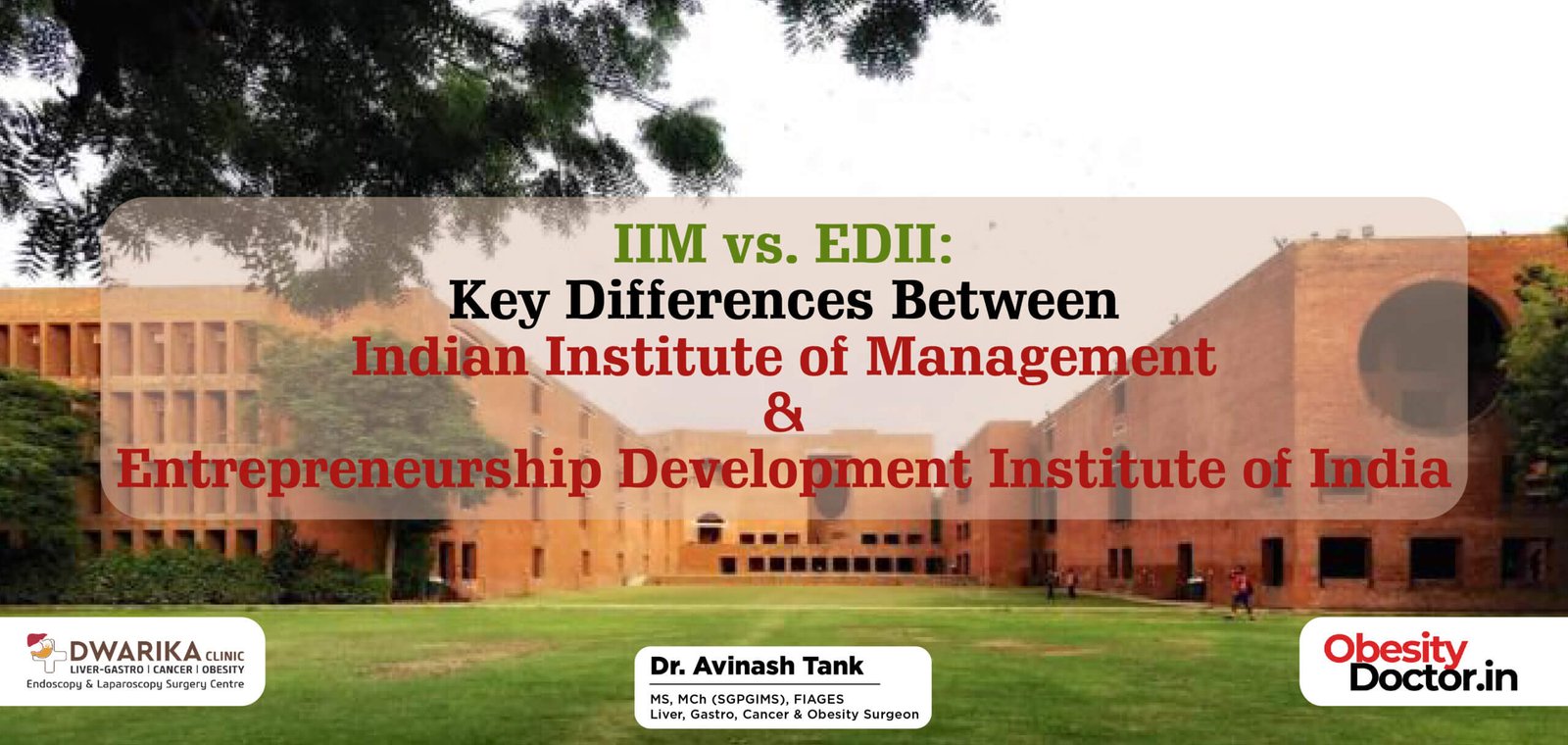
Reading Time: 4 minutes
IIM vs. EDII: Key Differences Between Indian Institute of Management & Entrepreneurship Development Institute of India. When considering premier business schools in India, two names frequently stand out: the Indian Institutes of Management (IIM) and the Entrepreneurship Development Institute of India (EDII).
Both institutions offer reputable programs that prepare students for careers in management, business, and entrepreneurship.
However, their focus areas, curriculum structures, and program objectives vary significantly.
In this article, we’ll dive deep into the key differences between IIM and EDII to help prospective students make informed choices.
1. Focus & Mission
• IIM:
The Indian Institutes of Management are renowned for their focus on business administration, management, and leadership. Established by the Indian government, IIMs aim to create leaders who excel in both private and public sectors.
Their programs emphasize strategic management, operations, finance, and human resources, making them an ideal choice for those looking to build careers in corporate management.
• EDII:
In contrast, EDII centers around entrepreneurship and innovation.
Founded in 1983, EDII is dedicated to fostering entrepreneurial mindsets and empowering individuals to start and manage their own businesses.
It is the ideal choice for individuals passionate about entrepreneurship, innovation, and small business management.
EDII’s mission is to equip students with skills for creating, growing, and sustaining enterprises, particularly within developing markets.
2. Program Offerings
• IIM:
The IIMs offer a wide range of programs, including the flagship Post Graduate Program in Management (PGP), which is equivalent to an MBA.
IIMs also offer executive programs, fellowships (equivalent to PhDs), and various short-term management development programs (MDPs) catering to professionals across different levels.
The curriculum at IIMs is intensive and prepares students to excel in high-level management roles.
• EDII:
EDII’s primary focus is on entrepreneurship. It offers the Post Graduate Diploma in Management – Business Entrepreneurship (PGDM-BE), specifically crafted for individuals aiming to launch and manage their ventures.
Additionally, EDII provides specialized programs and courses in social entrepreneurship, rural entrepreneurship, and family business management.
The institute also collaborates with international organizations to offer global exposure and opportunities for its students.
3. Teaching Methodology & Curriculum
• IIM:
IIMs adopt a case-study-based approach that emphasizes problem-solving and decision-making.
This methodology is designed to simulate real-life management scenarios, enabling students to apply theoretical knowledge to practical situations.
Subjects such as finance, marketing, organizational behavior, and strategic management are deeply integrated into the curriculum to provide a holistic business education.
• EDII:
At EDII, the teaching approach is highly practical, with a strong focus on experiential learning.
The curriculum emphasizes skills crucial to entrepreneurs, such as business ideation, feasibility studies, business modeling, and funding strategies.
Students participate in numerous hands-on projects, and some programs offer mentorship from established entrepreneurs, helping students gain real-world insights into starting and running a business.
4. Student Profile
• IIM:
IIMs attract students from diverse academic backgrounds, including engineering, commerce, and humanities.
Admission is highly competitive, requiring students to clear the Common Admission Test (CAT), which assesses analytical, quantitative, and verbal skills.
IIM students are often individuals aiming for high-impact roles in consulting, finance, marketing, and general management.
• EDII:
EDII’s programs are tailored for individuals passionate about entrepreneurship.
The institute attracts aspiring entrepreneurs, family business successors, and those seeking to make a social impact through business.
While EDII also values academic rigor, it places more emphasis on entrepreneurial drive, creative thinking, and a risk-taking mindset.
5. Placements & Career Opportunities
• IIM:
Graduates from IIMs often receive lucrative offers from top companies across industries such as consulting, finance, FMCG, and technology.
The institutes have robust placement cells that ensure high employment rates, with many students landing roles at multinational corporations.
IIM alumni networks are vast, and graduates benefit from strong professional connections and access to prestigious roles worldwide.
• EDII:
While EDII does not focus on traditional placements to the extent IIMs do, the institute has a strong track record of alumni who have gone on to establish successful startups and family businesses.
EDII fosters an entrepreneurial ecosystem, offering support through incubation, mentoring, and funding opportunities.
EDII graduates often become startup founders, business owners, and social entrepreneurs rather than entering the corporate job market.
6. Campus Environment & Culture
• IIM:
IIM campuses are often described as intense and highly competitive environments, with a strong focus on academic excellence, leadership, and career progression.
Students are encouraged to take on high workloads, engage in collaborative projects, and participate in case competitions that enhance their management skills.
• EDII:
The EDII campus environment is more oriented toward creativity, innovation, and risk-taking.
The institute encourages students to think like entrepreneurs, providing spaces and programs that foster creative problem-solving and innovation.
The culture is supportive, collaborative, and entrepreneurial, with an emphasis on personal development and learning through experience.
Conclusion
IIM vs. EDII: Key Differences Between Indian Institute of Management & Entrepreneurship Development Institute of India.
Choosing between IIM and EDII depends largely on your career aspirations and interests.
If you’re looking for a corporate career in management or consulting, IIM may be the better choice due to its rigorous training in traditional business disciplines and strong placement support.
However, if your ambition is to start your own business, lead a family enterprise, or make a social impact through entrepreneurship, EDII’s specialized programs and entrepreneurial ecosystem may be the perfect fit.
Both IIM and EDII are prestigious institutions that cater to different career paths. By understanding these differences, you can select the one that aligns best with your professional goals and personal values.
